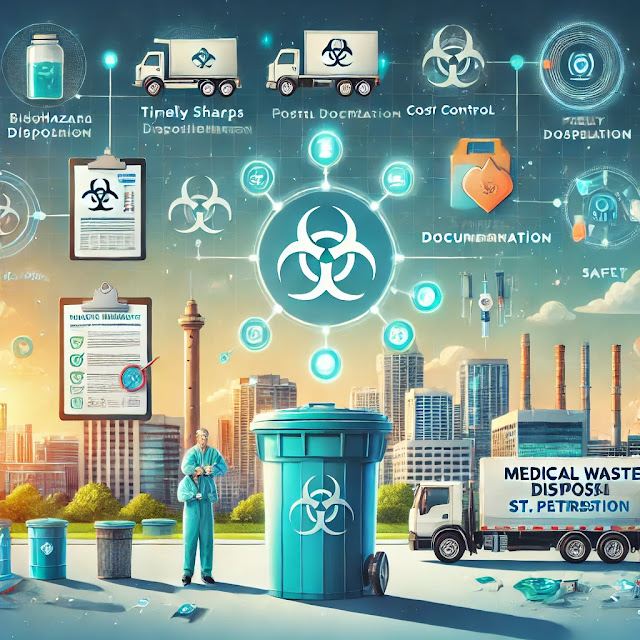Managing medical waste
is no walk in the park—unless that park is filled with needles and biohazard
bags (in which case, please call the authorities). Healthcare facilities in St.
Petersburg face unique challenges when it comes to waste management, from
staying compliant with regulations to keeping costs under control. Fortunately,
with the right strategies in place, even the most daunting challenges can be
handled efficiently.
Challenge #1:
Keeping Up with Regulations
Staying up to date
with medical waste regulations in St. Petersburg can feel like trying to keep
up with the latest iPhone release—just when you think you’ve got it all figured
out, there’s an update. Facilities must comply with state guidelines under the Florida
Administrative Code (64E-16), along with federal standards set by OSHA and
the EPA.
Solution:
- Regular Training: Hold periodic training sessions to keep
employees updated on new regulations.
- Compliance Monitoring Tools: Use digital tracking tools to ensure all
waste management practices align with the latest standards.
- Partner with Experts: Work with licensed waste disposal
providers who stay up to date on regulatory changes.
Falling behind on
compliance isn’t just stressful—it can be expensive, too. And unlike missing a
software update, the consequences are a bit more serious.
Challenge #2:
Managing Sharps Disposal Safely
Handling sharps such
as needles and scalpels is one of the biggest challenges in medical waste disposal in St.
Petersburg. A single needle-stick injury can pose serious health risks,
from infections to lawsuits.
Solution:
- Use FDA-Approved Containers: Invest in puncture-resistant containers
labeled with biohazard symbols.
- Train Employees on Safe Handling: Make sure all staff understand the
importance of careful handling and disposal.
- Offer Public Drop-Off Programs: Collaborate with pharmacies or local
agencies to provide drop-off points for sharps used outside of medical
facilities.
Proper sharps
management is like defusing a bomb—if done correctly, it’s no big deal. But if
you skip a step... let’s just say it’s better to follow the process.
Challenge #3:
Controlling Waste Management Costs
Let’s face it—managing
medical waste isn’t cheap. Facilities must balance the need for safe disposal
with tight budgets, especially in smaller clinics or healthcare centers.
Solution:
- Optimize Pickup Schedules: Avoid unnecessary pickups by monitoring
waste levels and scheduling collections only when needed.
- Segregate Waste Properly: Ensure only hazardous waste goes into
biohazard bags—general waste can be disposed of more economically.
- Explore Long-Term Contracts: Some waste disposal services offer
discounts for long-term commitments.
Think of it like
managing a household budget—if you can avoid unnecessary expenses, you’ll have
more room for the important stuff (like new lab equipment).
Challenge #4:
Timely Pickup and Waste Storage Issues
Medical waste can’t
sit around forever. St. Petersburg regulations limit waste storage to 30
days, but facilities also need timely pickups to prevent overflow and
ensure safety.
Solution:
- Work with Reliable Haulers: Partner with a waste disposal company
known for on-time pickups.
- Track Waste Levels in Real Time: Use monitoring systems to alert you when
containers are nearing capacity.
- Maintain Backup Plans: Always have a secondary provider or
emergency plan for times when your primary hauler can’t make it on
schedule.
It’s like waiting for
a bus—if it doesn’t show up on time, things can get messy quickly.
Challenge #5:
Ensuring Proper Documentation and Reporting
Healthcare facilities
must maintain accurate records of all waste management activities, including
pickup logs, employee training, and disposal certificates. Poor documentation
can lead to compliance issues, especially during inspections.
Solution:
- Use Digital Reporting Tools: Automate documentation to ensure records
are always up to date and easily accessible.
- Conduct Regular Audits: Perform internal audits to identify any
gaps in recordkeeping before the regulators do.
- Work with Transparent Providers: Partner with waste disposal services that
offer detailed reports for every pickup and disposal activity.
Keeping records in
order isn’t glamorous, but it’s necessary. Think of it as the paperwork before
a vacation—annoying, but worth it to avoid headaches later.
Conclusion:
Handling Challenges with Confidence
Managing medical
waste disposal in St. Petersburg comes with its fair share of challenges.
From navigating complex regulations to controlling costs, it’s essential to
have the right strategies and partnerships in place. With a little planning and
the right tools, your facility can operate smoothly, safely, and in full
compliance with the law.
The next step in this
journey? Embracing sustainability. Be sure to read our next article, “Sustainable Medical Waste Disposal in St. Petersburg: Eco-Friendly Practices for a Cleaner Future,” to discover how you can adopt green solutions and contribute to a
healthier environment.

Comments
Post a Comment